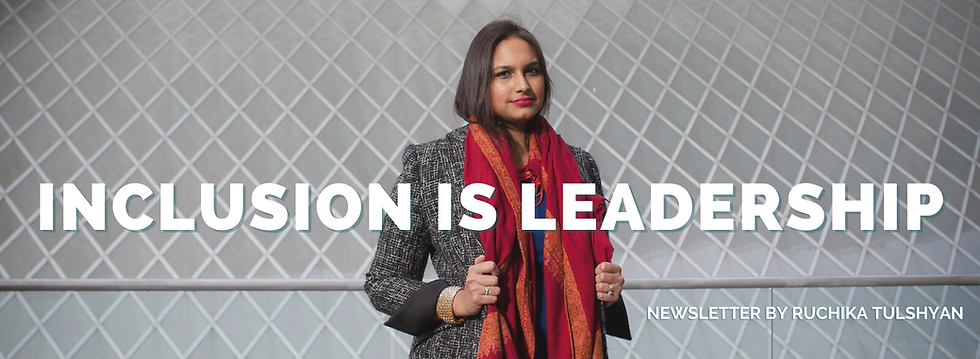A Real-Life Example of Performative Inclusion vs. Inclusive Leadership
- Ruchika T. Malhotra
- May 26, 2021
- 3 min read

It’s been more than a year since we plunged into a global pandemic. Depending on where you live, your skin color, your socioeconomic status and your profession, there have been moments (or whole blocks of time) where you were hit hard by the general grief and trauma of it all.
I’ve been privileged in so many ways for most of 2020. I’ve been inconvenienced, outraged and heartbroken, yes. But I did not have firsthand experience of the devastation waged by COVID-19 until 2021, when India’s tragedies came to international attention. Then, it knocked on our family’s door.
Suffice to say, I’ve been waking up with haunted dreams, heart palpitating at different times of the day, anxiously awaiting news while simultaneously scared to look at my phone. All while trying to work “as per normal” with people who haven’t been impacted in quite the same way.
Last week, a person I’ve worked with for many years emailed me with a work opportunity. I declined, letting them know that my family was personally impacted by the COVID situation in India.
Their response? “OK and thank you. Would you still be available to _____ and ______ so we can make the deadline?”
Performative Inclusion Hurts
I was...baffled. And hurt! Their callous response to my grief and anxiety shocked me. And, this person is well known in the Diversity, Equity and Inclusion (DEI) space!
I am lucky enough to decline the opportunity (I did) and if I choose, never work with this person again. But not everyone is – that person could be your boss, your client, or your coworker.
My experience made me stop and gave me infinitely greater empathy. There are so many workers reporting to managers or leaders right now who expect them to deliver at full capacity. In a pandemic. When there’s a rise in police shootings of unarmed Black people and anti-Asian hate crimes have gone up by at least 150%. When millions of working women, especially mothers and women of color, are losing their jobs.
We can’t deliver at full capacity right now. Physically. Emotionally. Humanly.
The pandemic has exposed deep inequalities (and continues to), which we simply can’t ignore. So many think DEI means running a fancy program or speaking about it in public forums or throwing money towards a social cause. That’s performative inclusion if you don’t complement those actions with inclusive leadership.

Inclusive Leadership Shows Up Every Day
Inclusive leadership isn’t about the big gestures. (Or if you’re influential enough to have a public platform, it’s not only about the big gestures.)
It’s about day-to-day compassion for your people. It’s knowing that your reality may be very different from others’ and reassuring your team that they’re still welcome even if they’re not performing at 100% capacity.
The best leaders would anticipate this already, but if someone has communicated that they’re in crisis, acknowledge it and offer support.
Check how people are doing. Push back deadlines liberally. Adjust expectations. Offer empathy and where possible, help. Most of all, give everyone room to say no and room to breathe.
I wrote a Harvard Business Review article about inclusive leadership in a crisis in March 2020–long before we had any inkling of what was really on the horizon. All I knew was my clients and classes were shifting to remote work. But I could already see that the gulf between the haves and have nots was widening. Sadly, the chasm continues to grow.
When I heard back from HBR readers, time and again, they said this tip I offered resonated with them the most:
“Show compassion. Managers must recognize that crises affect employees differently — for many from underrepresented communities, this means not just worrying about and providing care for their immediate family, but also caring for extended family and the larger community. Give employees time off if they’re sick or need to care for a sick person. Liberally push back deadlines as more people adjust to a new normal. And remember, not everyone has the set-up to be equally productive. Common barriers right now include inadequate access to technology, private space, or even the basics such as food or healthcare.”
If you’re in crisis right now, please know you're not alone. I write in complete solidarity. If you’re a people leader right now, how have you shown compassion? What does inclusive leadership in an ongoing pandemic mean to you?

.png)
Comments